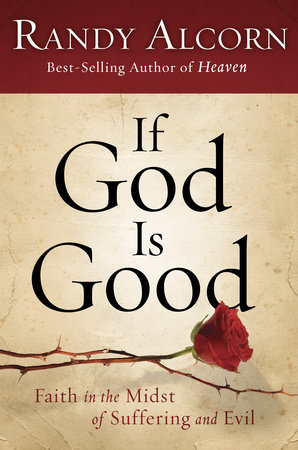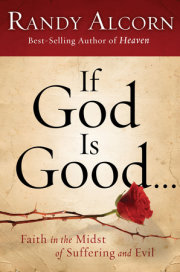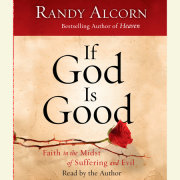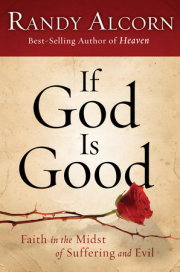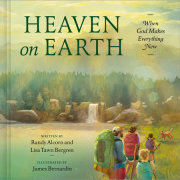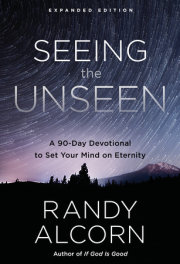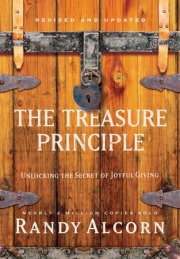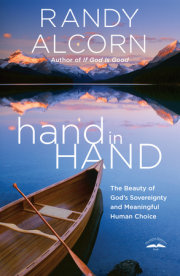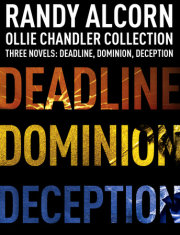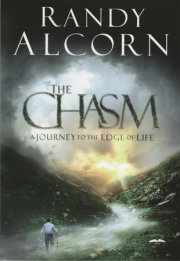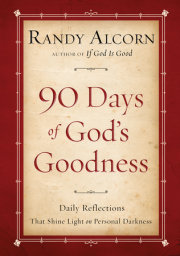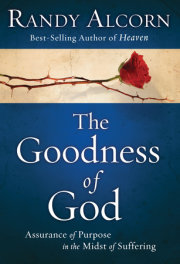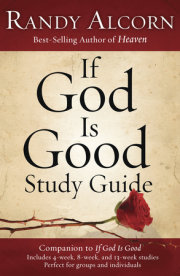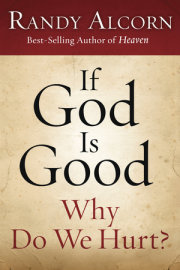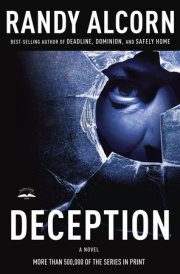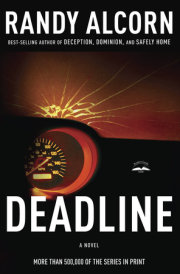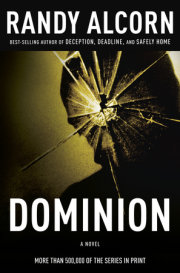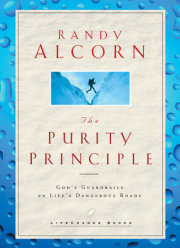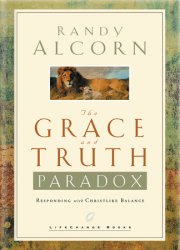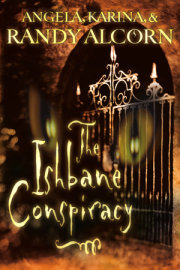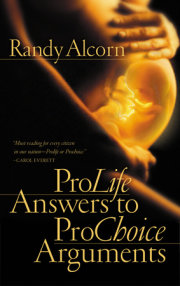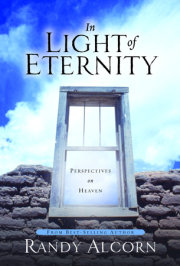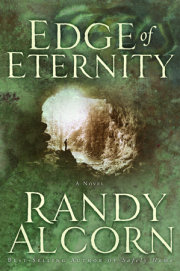Why Is the Problem of Evil
and Suffering So Important?
The problem of evil and suffering moves from the philosophical to the personal in a moment of time.
During my research I read all sorts of books–philosophical, theological, practical, and personal. It’s one thing to talk about evil and suffering philosophically; it’s another to live with it. Philosophy professor Peter van Inwagen wrote,
Angels may weep because the world is filled with suffering. A human being weeps because his daughter, she and not another, has died of leukemia this very night, or because her village, the only world she knows, is burning and the mutilated bodies of her husband and her son lie at her feet.1
Three weeks after his thirty-three-year-old son, Christopher, died in a car crash, pastor and evangelist Greg Laurie addressed a crowd of twenty-nine thousand at Angel Stadium in Anaheim, California. “I’ve talked about Heaven my whole life,” Laurie said, “and I’ve given many messages on life after death. I’ve counseled many people who have lost a loved one, and I thought I knew a little bit about it. But I have to say that when it happens to you, it’s a whole new world.” The day his son died, he told the crowd, was “the hardest day of my life.”2
When I spoke with Greg ten months later, his faith was strong, but his profound sense of loss remained. Pain is always local. It has a face and a name. And sometimes, for now, it doesn’t go away.
The American response to the terrorist attacks on September 11, 2001, demonstrated that large-scale evil and suffering usually remain distant from us.
In Sudan, millions, including children, have been murdered, raped, and enslaved. The 2004 Asian tsunami killed more than 280,000 people. Malaria causes more than two million fatalities annually, the majority of them African children. Around the world, some 26,500 children die every day; eighteen every minute.
The loss of American lives in the terrorist attacks of September 11, 2001, numbered 2,973–horrible indeed, yet a small fraction of the terror and loss of life faced daily around the world. The death toll in the 1994 Rwandan genocide, for example, amounted to more than
two World Trade Center disasters
every day for one hundred days straight. Americans discovered in one day what much of the world already knew–violent death comes quickly, hits hard, and can be unspeakably dreadful.
If we open our eyes, we’ll see the problem of evil and suffering even when it doesn’t touch us directly.
A friend of ours spoke at a Christian gathering. On her way back to her car, someone raped her. She became pregnant and gave birth to her first child. Because racial differences would have made it clear her husband hadn’t fathered the baby, the couple placed the infant for adoption. Since then, they’ve been unable to conceive another child. Her lifelong dream of raising children remains unfulfilled.
I once had to tell a wife, son, and daughter that their husband and father had died on a hunting trip. I still remember the anguished face of the little girl, then hearing her wail, “Not Daddy, no, not Daddy!”
Years ago I had to tell my mother that her only brother had been murdered with a meat cleaver.
A Christian woman tipped over on her riding lawn mower and fell into a pond. The machine landed on top of her, pinning her to the bottom and drowning her. Such a bizarre death prompted some to ask, “Why, God?” and “Why like this?”
After his wife died, in great pain C. S. Lewis realized, “If I had really cared, as I thought I did, about the sorrows of the world, I should not have been so overwhelmed when my own sorrow came.”3
Our own suffering is often our wake-up call. But even if you aren’t now facing it, look around and you’ll see many who are.
Why Talk About the Problem?
More people point to the problem of evil and suffering as their reason for not believing in God than any other–it is not merely a problem, it is the problem.
A Barna poll asked, “If you could ask God only one question and you knew he would give you an answer, what would you ask?” The most common response was, “Why is there pain and suffering in the world?”4
John Stott says,
The fact of suffering undoubtedly constitutes the single greatest challenge to the Christian faith, and has been in every generation. Its distribution and degree appear to be entirely random and therefore unfair. Sensitive spirits ask if it can possibly be reconciled with God’s justice and love.5
Richard Swinburne, writing in the
Oxford Companion to Philosophy, says the problem of evil is
“the most powerful objection to traditional theism.” 6
Ronald Nash writes, “Objections to theism come and go.… But every philosopher I know believes that the most serious challenge to theism was, is, and will continue to be the problem of evil.”7
You will not get far in a conversation with someone who rejects the Christian faith before the problem of evil is raised. Pulled out like the ultimate trump card, it’s supposed to silence believers and prove that the all-good and all-powerful God of the Bible doesn’t exist.
The problem of evil is atheism’s cornerstone.
German playwright Georg Büchner (1813—37) called the problem of evil “the rock of atheism.” Atheists point to the problem of evil as proof that the God of the Bible doesn’t exist. Every day the ancient argument gets raised in college philosophy classes, coffee shops, dinner discussions, e-mail exchanges, blogs, talk
shows, and best-selling books.
Atheists write page after page about evil and suffering. The problem of evil never strays far from their view; it intrudes upon chapters with vastly different subjects. It’s one of the central reasons Sam Harris writes, “Atheism is not a philosophy; it is not even a view of the world; it is simply an admission of the obvious.”
8 Harris then scolds Christians, saying about intelligent people (such as himself ), “We stand dumbstruck by
you–by your denial of tangible reality, by the suffering you create in service to your religious myths, and by your attachment to an imaginary God.”9 (At least we know what he’s thinking!)
Many suppose that scientific evidence is the cornerstone of atheism. But the famous one-time champion of atheism, Britain’s Anthony Flew, renounced his atheism due to the complexity of the universe and his belief in the overwhelming evidence for intelligent design. After examining Richard Dawkins’s reasoning in
The God Delusion–that the origin of life can be attributed to a “lucky chance”– Flew said, “If that’s the best argument you have, then the game is over.” However, although he abandoned his atheism, Flew did not convert to the Christian faith, but to deism. Why? Flew could not get past the problem of evil. He believes that God must have created the universe, then abandoned it.
A faith that leaves us unprepared for suffering is a false faith that
deserves to be lost.
A lot of bad theology inevitably surfaces when we face suffering. John Piper writes, “Wimpy worldviews make wimpy Christians. And wimpy Christians won’t survive the days ahead.”10
Auschwitz survivor Viktor Frankl wrote, “Just as the small fire is extinguished by the storm whereas a large fire is enhanced by it, likewise a weak faith is weakened by predicaments and catastrophes whereas a strong faith is strengthened by them.”11 When people lose their faith because of suffering, it’s usually a weak or nominal faith
that doesn’t account for or prepare them for evil and suffering. I believe that any faith not based on the truth needs to be lost. The sooner, the better.
Believing God exists is not the same as trusting the God who exists. A nominal Christian often discovers in suffering that his faith has been in his church, denomination, or family tradition, but not Christ. As he faces evil and suffering, he may lose his faith. But that’s actually a good thing. I have sympathy for people who lose their faith, but any faith lost in suffering wasn’t a faith worth keeping. (Genuine faith will be tested; false faith will be lost.)
If you base your faith on lack of affliction, your faith lives on the brink of extinction and will fall apart because of a frightening diagnosis or a shattering phone call. Token faith will not survive suffering, nor should it.
Suffering and evil exert a force that either pushes us away from God or pulls us toward him. I know a man who lost his faith after facing terrible evil, suffering, and injustice. My heart breaks for him, and I pray that my family and I will never suffer what he did. But if personal suffering gives sufficient evidence that God doesn’t exist, then surely I shouldn’t wait until
I suffer to conclude he’s a myth. If
my suffering would one day justify denying God, then I should deny him now in light of
other people’s suffering.
The devastation of tragedy feels just as real for people whose faith endures suffering.But because they know that others have suffered and learned to trust God anyway, they can apply that trust to God as they face their own disasters. Because they do not place their hope for health and abundance and secure relationships in this life, but in an eternal life to come, their hope remains firm regardless of what happens.
Losing your faith may be God’s gift to you. Only when you jettison ungrounded and untrue faith can you replace it with valid faith in the true God–faith that can pass, and even find strength in, the most formidable of life’s tests.
In her moving book
The Year of Magical Thinking, Joan Didion writes about the sudden, unexpected death of her husband. As I read, my heart broke not only for what happened to her, but for the first six words of the book’s concluding sentence: “No eye is on the sparrow.”12
Didion apparently means that so far as she can tell, there is no God, or at least, no God who cares and watches over us. She’s most likely a normal hurting person who needs men and women around her who can see God in the midst of their suffering, so they might help her see him in hers.
Suffering will come; we owe it to God, ourselves, and those around us
to prepare for it.
Live long enough and you
will suffer. In this life, the only way to avoid suffering is to die.
Bethany Hamilton grew up surfing on the island of Kauai, Hawaii. At age five she chose to follow Jesus. When she was thirteen, a fourteen-foot tiger shark attacked her, severing one of her arms. Bethany returned to surfing one month later. A year later, despite her disability, she won her first national title.
Bethany says, “It was Jesus Christ who gave me peace when I got attacked by the shark.… And it was what God had taught me growing up that helped me overcome my fears…to get back into the water to keep surfing.”
She continues, “My mom and I were praying before the shark attack that God would use me. Well, to me, 1 Timothy 1:12 kind of tells me that God considered me faithful enough to appoint me to his service. I just want to say that no matter who you are, God can use you even if you think you’re not the kind of person that can be used. You might think: why would God use me? That’s what I thought.… I was like thirteen and there God goes using me!”13
Bethany and her parents had given careful thought to the God they served and his sovereign purposes. Obviously not every tragedy leads to winning a national title, but Bethany began where all of us can, by trusting God; in her case, with a support system of people having an eternal perspective. Hence, she was prepared to face suffering when it came, and to emerge stronger.
Unfortunately, most evangelical churches–whether traditional, liturgical, or emergent–have failed to teach people to think biblically about the realities of evil and suffering. A pastor’s daughter told me, “I was never taught the Christian life was going to be difficult. I’ve discovered it is, and I wasn’t ready.”
A young woman battling cancer wrote me, “I was surprised that when it happened, it was hard and it hurt and I was sad and I couldn’t find anything good or redeeming about my losses. I never expected that a Christian who had access to God could feel so empty and alone.”
Our failure to teach a biblical theology of suffering leaves Christians unprepared for harsh realities. It also leaves our children vulnerable to history, philosophy, and global studies classes that raise the problems of evil and suffering while denying the Christian worldview. Since the question
will be raised, shouldn’t Christian parents and churches raise it first and take people to Scripture to see what God says about it?
Most of us don’t give focused thought to evil and suffering until we experience them. This forces us to formulate perspective on the fly, at a time when our thinking is muddled and we’re exhausted and consumed by pressing issues. Readers who have “been there” will attest that it’s far better to think through suffering in advance.
Sometimes sufferers reach out for answers to those woefully unprepared. A physician’s assistant friend of ours wrote,
When I was admitted to the hospital in sepsis with a 50/50 chance of survival, I asked the chaplain how we could believe that God is love, when this felt like the antithesis of love. I said I wouldn’t inflict this much suffering
on someone I hated, let alone someone I loved. She told me she would “look it up,” then left my room and never came back. I posed the same question to the social worker who came to visit me a few days later. She
told me that God’s like a giant and we’re like little ants, and sometimes He accidentally steps on our ant hills and some of us get hurt. She said our suffering is random and God’s probably not even aware of it.
Pastor James Montgomery Boice had a clearer perspective. In May 2000, he stood before his Philadelphia church and explained that he’d been diagnosed with liver cancer:
Should you pray for a miracle? Well, you’re free to do that, of course. My general impression is that the God who is able to do miracles–and He certainly can–is also able to keep you from getting the problem in the
first place. So although miracles do happen, they’re rare by definition.…Above all, I would say pray for the glory of God. If you think of God glorifying Himself in history and you say, where in all of history has God most glorified Himself? He did it at the cross of Jesus Christ, and it wasn’t by delivering Jesus from the cross, though He could have.…God is in charge. When things like this come into our lives, they are not accidental. It’s not as if God somehow forgot what was going on, and something bad slipped by.… God is not only the one who is in charge; God is also good. Everything He does is good.… If God does something in your life, would you change it? If you’d change it, you’d make it worse. It wouldn’t be as good.14
Eight weeks later, having taught his people first how to live and then how to die, Pastor Boice departed this world to “be with Christ, which is better by far” (Philippians 1:23).
On the other side of death, the Bible promises that all who know him will fall into the open arms of a holy, loving, and gracious God–the greatest miracle, the answer to the problem of evil and suffering. He promises us an eternal kingdom on the New Earth, where he says of those who come to trust him in this present world of evil and suffering, “They will be his people, and God himself will be with them and be their God. He will wipe every tear from their eyes. There will be no more death or mourning or crying or pain” (Revelation 21:3—4).
Copyright © 2009 by Randy Alcorn. All rights reserved. No part of this excerpt may be reproduced or reprinted without permission in writing from the publisher.

